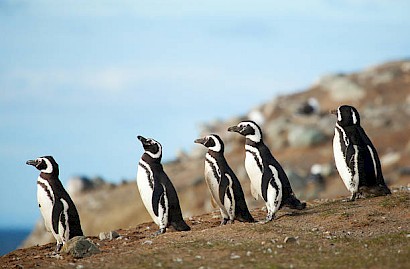Heat wave ‘caused mass penguin die-off’ in chilling warning of climate change effects
 Climate change will not have terrifying effects not just on human lives – but on wildlife, a new report into a deadly heat event which killed hundreds of penguins has shown.
Climate change will not have terrifying effects not just on human lives – but on wildlife, a new report into a deadly heat event which killed hundreds of penguins has shown.
Researchers from the University of Washington witnessed an extreme heat event in Argentina which struck one of the world’s largest breeding colonies for Magellanic penguins in 2019.
In Jan. last year, temperatures at the site in Punta Tombo, on the country’s southern coast, spiked to 44C in the shade.
The extreme heat wave killed at least 354 penguins, based on a search for bodies by the researchers in the days following the record high temperature.
Lead author Katie Holt, a UW doctoral student in biology said, “This extreme event fell near the tail end of the breeding season for Magellanic penguins, so it killed a large number of adults, as well as chicks.
“It’s the first time we’ve recorded a mass mortality event at Punta Tombo connected to extreme temperatures.”
The 19 January heat wave was the highest temperature the researchers have ever recorded at Punta Tombo.
Nearly three-quarters (264) of the penguins that died were adults, many of which likely died of dehydration, based on post-mortem analyses.
They found 27% of adult penguin corpses along paths heading out of the breeding colony to the ocean, where they could get a drink – penguins have glands that can filter salt out of the water.
Dead adults were often found on their stomachs with their feet and flippers extended and mouth open, a common panting and cooling pose for Magellanic penguins.
The 2019 heat wave is a particular concern because it led to the loss of a large number of adults in a single event, according to Holt.
“Any mass die-off like this is a concern,” said Holt. “But what is most concerning about heat-death mortality is that it has the potential to kill a lot of adults.
“The population viability of long-lived seabirds – like Magellanic penguins – relies on long lifespans. Adult Magellanic penguins can live more than 30 years, so they typically have many opportunities to successfully raise chicks. If we’re losing large numbers of adults from a single event like this, that’s a major concern.”
Climate change is expected to produce more extreme weather events of all types globally, though effects will vary by locality.
The consequences of this heat wave, though grim, also show scientists the limits that some species can endure.
“Penguins could have the ability to cope, like moving breeding sites,” said Holt. “But it will take time to investigate whether those adaptations are effective.”
You can return to the main Market News page, or press the Back button on your browser.

